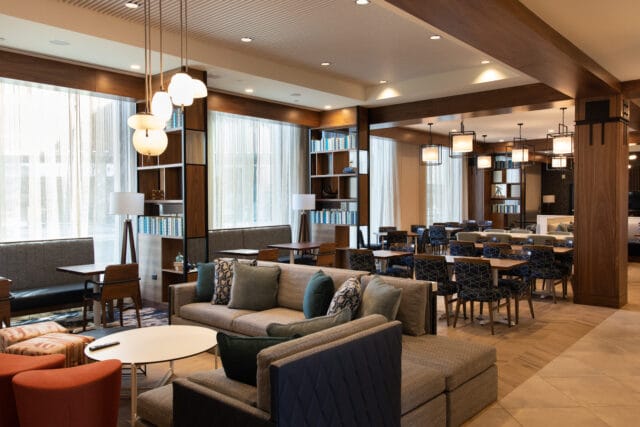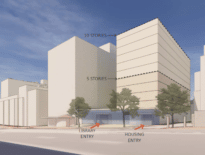
The Newbury Boston hotel reopened in mid-May, following a 17-month shutdown for a major renovation project, and is relying on weekend leisure travel for the bulk of its short-term demand. Photo by Durston Saylor | Courtesy
The pandemic kicked two legs out from under the Boston hotel industry’s three-legged stool of leisure, business and convention travel, and forced operators to close or operate at bare minimums.
As the downtown economy reopens, Boston is set to absorb nearly 2,200 additional hotel rooms this year including brand-new properties, those reopening following major renovations and expansions. The additional 5.5 percent in room supply is the largest in 20 years, and it hits a market that suffered the nation’s second-worst financial performance after New York City in 2020. Revenues per available room declined nearly 75 percent in Boston, according to Pinnacle Advisory Group.
“It was 566 days before I was able to hold a door open as a guest was coming into our lobby,” said Carlos Buenos, managing director of the Newbury Boston hotel. “While I had a lot of interactions with guests, it was mainly Zoom-based, and some hardhat tours recently. I miss the interaction.”
The Massachusetts hospitality industry received an unexpected boost with Gov. Charlie Baker’s May 17 decision to lift COVID occupancy restrictions effective this past weekend. The hotel market was already starting to see a bit of a recovery in April and May, pointing to a gradual recovery for occupancy, room rates and revenue per available room (RevPAR).
But hotels accustomed to welcoming a steady stream of conventioneers and business travelers will have to wait well into 2022 before seeing a return to a more balanced mix of demand. Leisure travelers are expected to comprise fully 55 percent of demand in 2021, according to Pinnacle data. In 2019, Boston-Cambridge hotels received nearly two-thirds of their demand from corporate and group business, according to Pinnacle.
Close Eye on Office Occupancy Plans
In the Seaport District, a dual-branded hotel that was designed to attract a significant amount of conventioneers and extended-stay corporate travelers is filling its meeting and event spaces with events such as small business gatherings and a graduation party.
Located at 670 Summer St., the Hampton Inn and Homewood Suites by Hilton Boston Seaport opened April 6. General Manager Charlie York said travelers are starting to make longer-term plans, with bookings averaging three to five days in advance, compared to one to three days when it first opened. York is looking for hints from Seaport District companies about their return-to-office plans and what it means for corporate travel.
“Our business travel is seeing a slow uptick. A lot of the local offices have shared that they are bringing back team members between July and August,” York said.

Executives at the new Hampton Inn and Homewood Suites by Hilton in Boston’s Seaport District are keeping an eye on local companies return-to-office plans and future bookings at the Boston Convention and Exhibition Center to fill its 416 guest rooms. Photo by Read McKendree | Courtesy
The hotel’s meeting rooms have hosted a handful of small business gatherings, and the 200-capacity ballroom has been reserved for weddings this summer, York said.
The Boston Convention and Exhibition Center showed its first post-pandemic signs of life in May, hosting a volleyball competition, before preparing to welcome larger business events such as a seafood expo and the Heart Rhythm Society meeting in July and the North American Spine Society’s annual meeting in late September.
The pace of the BCEC’s revival will play a significant role in the early days of the 1,055-room Omni Boston Seaport Hotel, the culmination of the Massachusetts Convention Center Authority’s long search for a “headquarters” hotel at the doorstep to its meeting hall. Omni hotel team executives were not available for comment.
Meeting planners typically require at least six months’ notice deciding whether to go ahead with an event, which points to a mid-fall revival of BCEC activity, said Chad Crandell, president of Beverly-based hotel asset managers CMHWarnick.
“You’re not going to see a lot of convention center activity until maybe the fourth quarter of this year, and that’s not typically the strongest quarter for Boston to begin with,” Crandell said. “The real recovery for the convention center industry in Boston is likely to be in 2022.”
Timing Is Everything
In downtown Boston, two hotels that closed before the pandemic to begin long-planned renovation projects are back in business and relying on weekend bookings for the bulk of their activity.
The Langham Boston, which is owned by Pacific Eagle Holdings, closed in April 2019 for a repositioning including brand-new guest rooms and dining areas. Since the Post Office Square landmark reopened this month, event bookings have included weddings, baby showers and birthday parties, director of sales and marketing Rachelle Boudreau said via email. Despite the property’s location in the Financial District, occupancy is expected to be highest on weekends.
Executives for hotel manager Highgate began planning their own makeover of the 286-room Newbury Boston property in 2017, working with three designer teams on new guest rooms and public spaces, culinary partners and a new rooftop restaurant. The hotel had been closed from November 2019 until its reopening May 18.
Weekend leisure travel has been the strongest segment of the hotel’s business since it reopened, said Buenos, the managing director. The film industry also has been a source of room demand during productions being shot in Boston.

Steve Adams
“Our intention has always been to open our doors with 10 or 15 percent occupancy, then work our way up to 25 or 30 percent in June and July,” he said.
According to Pinnacle data, the 24,000-room Boston-Cambridge market had begun to recover before Baker’s reopening announcement. Occupancy rates hit 31 percent with average daily rates of $147 and RevPar of $46, still a far cry from the 88 percent occupancy rates and $286 daily room rates of April 2019.
Logan International Airport passenger volume topped 20,000 passengers a day in April, a 37 percent increase from March, but international travel is likely to remain minimal for the rest of the year, according to a Pinnacle report. The firm projects an early fall rebound for regional business travel and face-to-face meetings, and an uptick in group travel during the third quarter as BCEC and Hynes Convention Center events generate demand for 86,700 room nights.
Editor’s note: A previous version of this report incorrectly included a dollar value of the Newbury Boston project.




 |
| 

